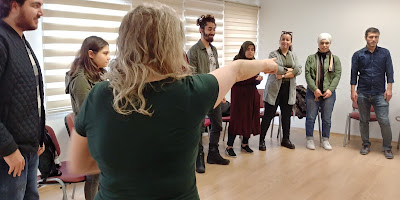 |
| Lucy Dunkerley leading a workshop game in Adana |
One scene in particular resonated very powerfully with the wider project. Two young men sat hunched on the floor - clearly cold and hungry. Two others gave them coats to cover themselves. Time moved on - and two further characters appeared, who attacked them and stole the coats. The piece ended in even deeper despair than it had begun. This, the young men told us, is the reality of their lives today. In the year that has passed since we first came to Adana, the situation for the refugees has got worse, not better. There are very few resources being allocated to help them - after all, the Turkish lira has plummeted in value - and the atmosphere has grown more hostile towards their presence.
Our workshop with the students began to suggest some possibilities as to why this might be. The issues they were raising included political and social concerns - but the initial images that they created were often quite simplistic and clichéd, suggesting a received perception filtered through media, rather than a personal, lived experience. So, for example, a scene responding to the idea of "terror" involved a veiled woman with a gun attacking two civilians. We were able to challenge the scene - to take out the costume element and to ask the students what it might mean in this different form. It was fascinating to see how they rose to the challenge: they were clearly not used to being asked to respond to their cultural and political context in a creative way. It was liberating for them. As the workshop ended, and we asked whether they had any questions, the first response was "When can you come back and do some more work like this?". Of course, we can't go to Adana every month - but this Erasmus + project is about sharing methodologies, and the approach we took can be applied again.
The student workshop was also attended by a young refugee woman we had met in January. It was very clear that her presence was something the students found disconcerting, although it had not prevented them from falling into clichéd representations of who such Syrians might be. Afterwards, she told us that there is very little real contact between the refugee community and the host population. They are in Turkey but not of Turkey - held in a limbo to which there is no defined conclusion. Her father, who was a lawyer in Syria, had been trying to establish a community organisation as a framework for refugees to help themselves: but he cannot do so, as it is illegal. And so the community relies on NGOs, whose funding is very unstable, while their plight is driven off the front pages by the antics of Trump and the farce of Brexit.
I filmed some of the refugee workshop as material for the MORE THAN WORDS film. At the end of the session, one of the young men, who had performed in the scene around the coats, asked what I would do with the footage. "Make a good film" he said. "Show it everywhere. We want people to know what is happening here. People must not forget the refugees."
His friend had a very different question. He wanted to know how he could learn more about theatre. He hoped to become a performer one day. It was intensely moving to see his hope, his energy and his desire for expression. Between them, they reminded me of something Brecht wrote:
“In the dark times
Will there also be singing?
Yes, there will also be singing.
About the dark times.”
Comments
Post a Comment